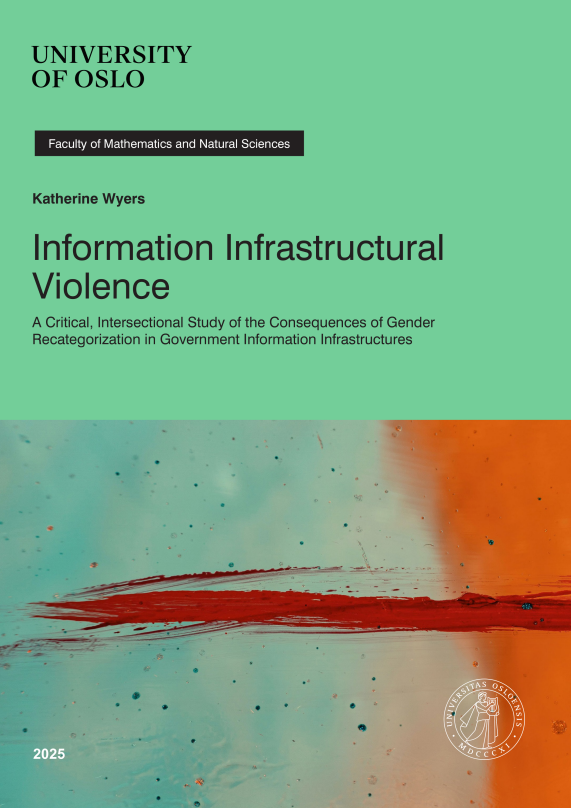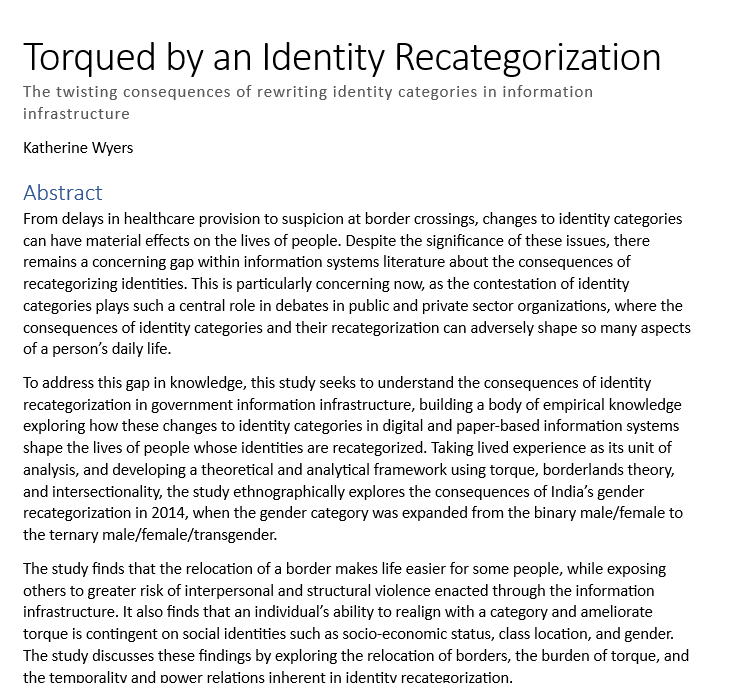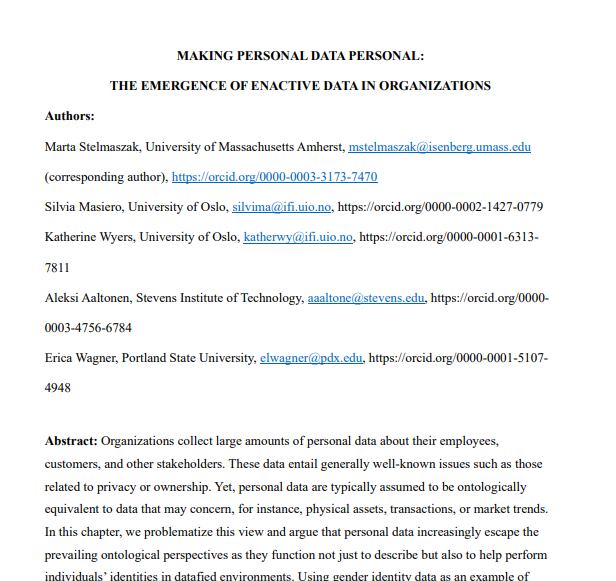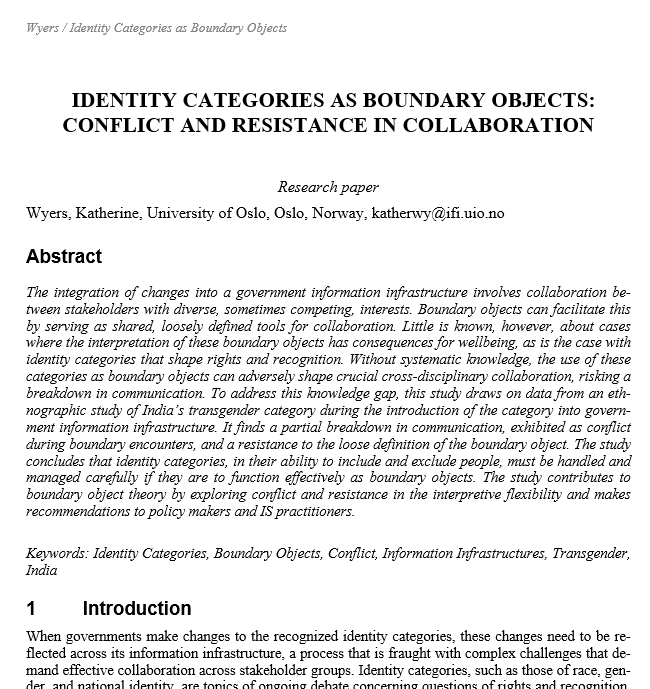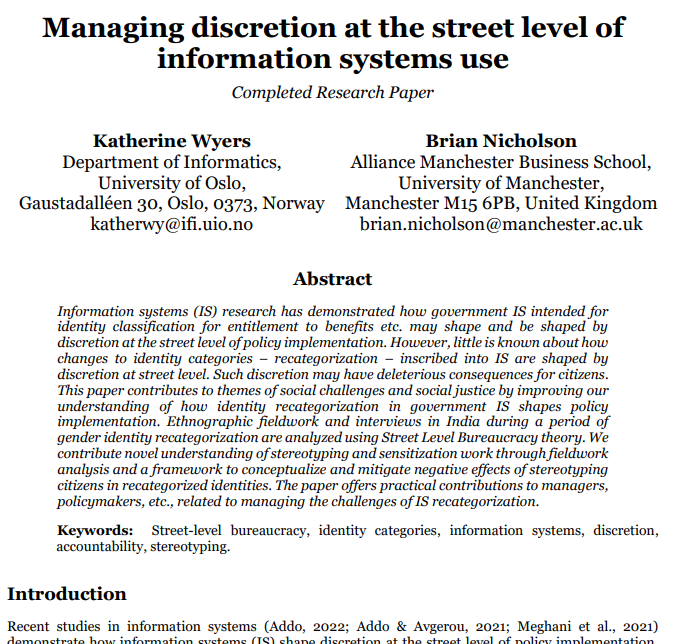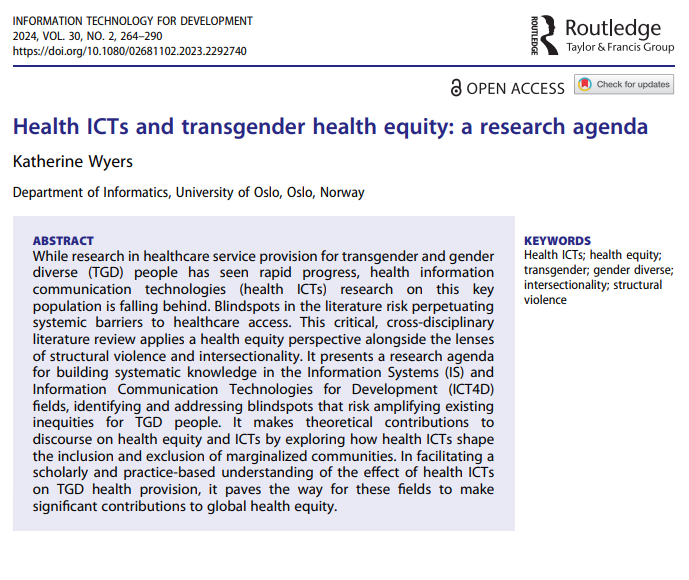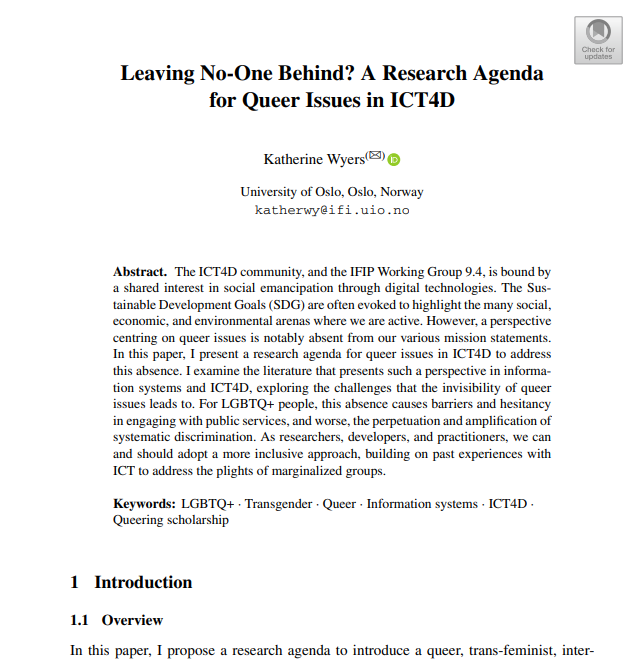Research
I’m interested in the relationship between large-scale government decisions around information infrastructures and the consequences of these decisions on the everyday lives of people. I’m particularly focused on the consequences for people who are members of the LGBTQ+ population.
Theoretically, most of my recent work has used information infrastructure theory, intersectionality, and structural violence. My PhD thesis (below) extends information infrastructure theory towards a theory of information infrastructural violence.
Over the past few years, I’ve published several academic articles on topics of information infrastructures, identity recategorization, and social justice for people with LGBTQ+ identities. Below you’ll see the abstract of the articles with a link where you can read the full paper.
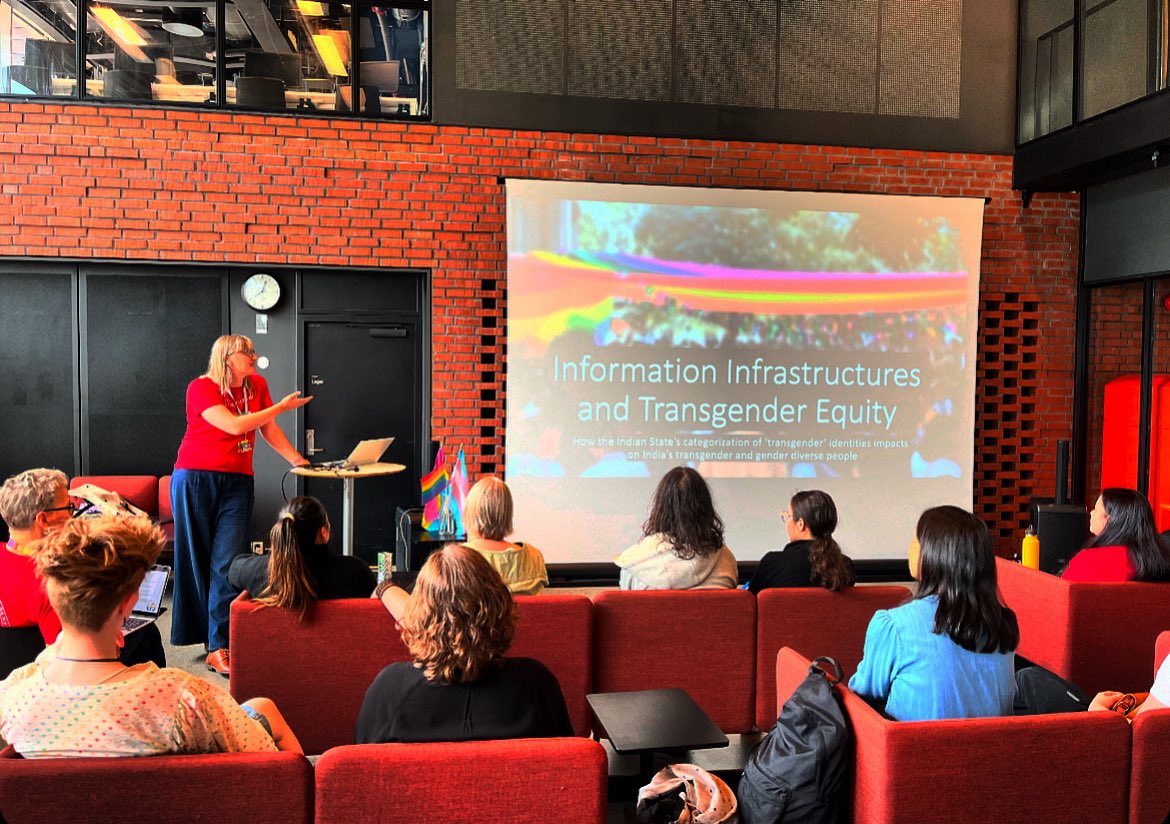
Information Infrastructural Violence: A Critical, Intersectional Study of the Consequences of Gender Recategorization in Government Information Infrastructures
Wyers, K. (2025) Information Infrastructural Violence: A Critical, Intersectional Study of Gender Recategorization in Government Information Infrastructure, Doctoral Thesis, Department of Informatics, University of Oslo, Norway.
Keywords: Information Infrastructures, Gender Recategorization, Government, Intersectionality, Transgender, India.
Theoretical Framework and Methods
- Ethnographic Methods
- Infrastructure Theory
- Intersectionality
- Structural Violence
- Critical Research
- Identity and Categories
Empirical Case
- Transgender and Gender Diverse People
- North India
- Lived Experiences during Recategorization
- Government Recategorization
Findings and Contribution
A slow-changing government information infrastructure can have violent consequences on the daily life of an individual, especially if they are disadvantaged by racism, sexism, ableism, or other structural systems of oppression.
Abstract: Whether in delays to healthcare provision, or suspicion at border crossings, identity categories shape our lives and can have an adverse effect on those who are deemed to fall outside or transgress the identity categories. Despite their significance, there is relatively little known within the information systems (IS) discipline about the consequences of identity recategorization. This is particularly concerning at present, because the contestations surrounding categories of race, gender, nationality, and other identity categories play such a central role in many of the debates in public and private sector organizations, where the consequences of these categories and their recategorization can adversely shape many aspects of a person’s daily life.
From a technical perspective, information infrastructures (IIs) are composed of various classification systems, protocols, and technical specifications that codify the rules and procedures for interaction between a system’s elements (Turner et al., 2006, p. 94). However, IIs are fundamentally a relational concept (Star & Ruhleder, 1996). They are engines of ontological change that stand between people, technology, and nature, reinforcing each simultaneously (Karasti et al., 2018, p. 271). As the requirements for the classifications change, these IIs need to be changed so they remain aligned. Without this process of change, the systems relying on the infrastructure would seize up and no longer function as needed, becoming stiff and unworkable (Jackson, 2014, p. 223).
Identity categories are not merely neutral, objective representations of reality. They are often sites of political and social struggles (Bowker & Star, 1999). This political struggle can become firmly entrenched into the working infrastructure when II evolution involves the integration of identity category changes, and this has moral and ethical implications. Identity categories have material effects on the lives of the people they target (Beaudevin & Schramm, 2019) and when created or changed by the State, identity claims by individuals can be subverted, or individuals can feel their rights to self-definition are impinged upon (Yanow, 2003). For those who are disadvantaged by such changes, the infrastructure can have a detrimental impact on their lives (Bowker & Star, 1999).
This study seeks to understand the consequences of making changes to an identity category in a government II. It explores the case of India’s gender category, which in 2014 was expanded from legally recognizing two genders, {male, female}, to recognizing three genders, {male, female, transgender}. This change was introduced by the Indian Supreme Court to legally recognize India’s transgender community, a change that came with concomitant updates to the II.
Grounded in post-structuralism and critical interpretivism, this study drew on three months of ethnographic fieldwork conducted in the rural north Indian state of Himachal Pradesh, and the urban center of Delhi. The data comprised of 28 semi-structured interviews with transgender and gender diverse (TGD) people, bureaucrats, and members of civil society, together with a focus group discussion, and document analysis from the period 2014 to 2024. The findings were triangulated with fieldnotes from the three months of fieldwork.
The thesis presents five research papers. Paper 1 explores methodologies used when studying the relationship between TGD people and information systems, encouraging critical feminist methodologies and deep engagement with the research context. Paper 2 explores the consequences of identity recategorization with regards to cross-disciplinary collaboration during periods of II evolution, finding conflict and resistance to the loose definition of identity categories. Paper 3 shows how IS use has been shaped at the street level of policy implementation, and the emergence of identity stereotyping during recategorization. Paper 4 illustrates how the lived experiences of TGD people have been shaped by the recategorization of their identities within the government II and shows how they navigate their identities during the period of evolution. Paper 5 explores the ontological foundations of identity representation in organizational data and argues for a rethinking of the enumerative approach that is typically used to represent identities in data. This thesis then discusses these findings with regards to burden, power differentials, and slow change. From this, the thesis proposes an extension to II theory using intersectionality, structural violence, and slow violence and presents the collateral burden construct to represent the burden placed on the shoulders of the individuals during information infrastructural change.
This study makes several theoretical, methodological, and practical contributions. It makes theoretical contributions by proposing an expansion to II theory based on empirical analysis to consider the relationship between the slow changing temporality of IIs and the everyday lives of individuals. It shows the high level of hidden work that takes place during such a period of II evolution. It explores the potential risk of the installed base harboring systemic bias, and discusses how nations with a post-colonial history, or a history of racism, sexism, or ableism can have an installed base that can harbor biases in need of interrogation. The study makes practical contributions by showing the potential negative consequences of a change to an identity category and highlights key areas where plans can be made to mitigate these consequences during the process of identity category change. The study contributes to the communities of the participants by amplifying the voices of India’s transgender and gender diverse people from a wide range of gender identities and expressions. It also highlights the crucial work performed by advocacy groups and civil society members during the change process.
Torqued by an Identity Recategorization: The twisting consequences of rewriting identity categories in information infrastructure
Work In Progress
Abstract: From delays in healthcare provision to suspicion at border crossings, changes to identity categories can have material effects on the lives of people. Despite the significance of these issues, there remains a concerning gap within information systems literature about the consequences of recategorizing identities. This is particularly concerning now, as the contestation of identity categories plays such a central role in debates in public and private sector organizations, where the consequences of identity categories and their recategorization can adversely shape so many aspects of a person’s daily life.
To address this gap in knowledge, this study seeks to understand the consequences of identity recategorization in government information infrastructure, building a body of empirical knowledge exploring how these changes to identity categories in digital and paper-based information systems shape the lives of people whose identities are recategorized. Taking lived experience as its unit of analysis, and developing a theoretical and analytical framework using torque, borderlands theory, and intersectionality, the study ethnographically explores the consequences of India’s gender recategorization in 2014, when the gender category was expanded from the binary male/female to the ternary male/female/transgender.
The study finds that the relocation of a border makes life easier for some people, while exposing others to greater risk of interpersonal and structural violence enacted through the information infrastructure. It also finds that an individual’s ability to realign with a category and ameliorate torque is contingent on social identities such as socio-economic status, class location, and gender. The study discusses these findings by exploring the relocation of borders, the burden of torque, and the temporality and power relations inherent in identity recategorization.
The study makes theoretical and methodological contributions to the information systems discipline. It takes lived experience as a unit of analysis to understand the consequences of information systems and develops the torque theoretical construct to understand paths through which the information systems can mitigate against these unintended negative consequences. The study also makes practical contributions for organizations in the public and private sectors where information systems engage with identity categories and recategorization.
Keywords: Identity Recategorization, Information Infrastructures, Torque, Intersectionality, Transgender, India.
Making Personal Data Personal: The Emergence of Enactive Data in Organizations
Stelmaszak M., Masiero S., Wyers K., Aaltonen A., Wagner E. (forthcoming) Making Personal Data Personal: The Emergence of Enactive Data in Organizations, in Poonamallee L. Technology and Social Justice: Managerial Perspectives on Innovation, Equity, and Power, Springer
Abstract: Organizations collect large amounts of personal data about their employees, customers, and other stakeholders. These data entail generally well-known issues such as those related to privacy or ownership. Yet, personal data are typically assumed to be ontologically equivalent to data that may concern, for instance, physical assets, transactions, or market trends. In this chapter, we problematize this view and argue that personal data increasingly escape the prevailing ontological perspectives as they function not just to describe but also to help perform individuals’ identities in datafied environments. Using gender identity data as an example of personal data that are used by individuals to enact their identities, we conceptualize enactive data as a new type of data in organizations. We then discuss the challenges and opportunities that enactive data pose for social justice, organizations, and personal data research.
Keywords: Data management, gender, personal data, recognition, representation, data justice
Identity Categories as Boundary Objects: Conflict and Resistance in Collaboration
Best Paper Award
Scandinavian Conference on Information Systems 2025
Wyers, K. (2025) Identity Categories as Boundary Objects: Conflict and Resistance in Collaboration, Proceedings of the 16th Scandinavian Conference on Information Systems (SCIS2025), Oslo, Norway, August 2025.
Abstract: The integration of changes into a government information infrastructure involves collaboration between stakeholders with diverse, sometimes competing, interests. Boundary objects can facilitate this by serving as shared, loosely defined tools for collaboration. Little is known, however, about cases where the interpretation of these boundary objects has consequences for wellbeing, as is the case with identity categories that shape rights and recognition. Without systematic knowledge, the use of these categories as boundary objects can adversely shape crucial cross-disciplinary collaboration, risking a breakdown in communication. To address this knowledge gap, this study draws on data from an ethnographic study of India’s transgender category during the introduction of the category into government information infrastructure. It finds a partial breakdown in communication, exhibited as conflict during boundary encounters, and a resistance to the loose definition of the boundary object. The study concludes that identity categories, in their ability to include and exclude people, must be handled and managed carefully if they are to function effectively as boundary objects. The study contributes to boundary object theory by exploring conflict and resistance in the interpretive flexibility and makes recommendations to policy makers and IS practitioners.
Keywords: Identity Categories, Boundary Objects, Conflict, Information Infrastructures, Transgender, India.
Managing Discretion at the Street-level of Information Systems Use
AIS SIG Global Development Workshop 2024
https://aisel.aisnet.org/globdev2024/4/
Wyers, K., Nicholson, B. (2024) Managing Discretion at the Street Level of Information Systems Use, Association of Information Systems Special Interest Group Global Development, Bangkok, Thailand, December 2024.
Abstract: Information systems (IS) research has demonstrated how government IS intended for identity classification for entitlement to benefits etc. may shape and be shaped by discretion at the street level of policy implementation. However, little is known about how changes to identity categories – recategorization – inscribed into IS are shaped by discretion at street level. Such discretion may have deleterious consequences for citizens. This paper contributes to themes of social challenges and social justice by improving our understanding of how identity recategorization in government IS shapes policy implementation. Ethnographic fieldwork and interviews in India during a period of gender identity recategorization are analyzed using Street Level Bureaucracy theory. We contribute novel understanding of stereotyping and sensitization work through fieldwork analysis and a framework to conceptualize and mitigate negative effects of stereotyping citizens in recategorized identities. The paper offers practical contributions to managers, policymakers, etc., related to managing the challenges of IS recategorization.
Keywords: Street-level bureaucracy, identity categories, information systems, discretion, accountability, stereotyping.
Health ICTs and transgender health equity: A research agenda
Information Technology for Development Journal 2024
Wyers, K. (2024). Health ICTs and transgender health equity: A research agenda. Information Technology for Development, 30(2), 264–290.
Abstract: While research in healthcare service provision for transgender and gender diverse (TGD) people has seen rapid progress, health information communication technologies (health ICTs) research on this key population is falling behind. Blindspots in the literature risk perpetuating systemic barriers to healthcare access. This critical, cross-disciplinary literature review applies a health equity perspective alongside the lenses of structural violence and intersectionality. It presents a research agenda for building systematic knowledge in the Information Systems (IS) and Information Communication Technologies for Development (ICT4D) fields, identifying and addressing blindspots that risk amplifying existing inequities for TGD people. It makes theoretical contributions to discourse on health equity and ICTs by exploring how health ICTs shape the inclusion and exclusion of marginalized communities. In facilitating a scholarly and practice-based understanding of the effect of health ICTs on TGD health provision, it paves the way for these fields to make significant contributions to global health equity.
Keywords: Health ICTs, health equity, transgender, gender diverse, intersectionality, structural violence.
Identity Platforms and Anti-LGBTQ+ Legislation: Implications for Safeguarding Personal Data
Joint IFIP Conference 2023
Wyers, K., Nicholson B., Russpatrick S., Masiero S (2023) Identity Platforms and Anti-LGBTQ+ Legislation: Implications for Safeguarding Personal Data. Joint IFIP Conference, Hyderabad, India, December 2023.
Abstract: Little is known about how digital identity platforms can be managed
and operated in countries where governments have introduced anti-LGBTQ+ legislation. This work-in-progress study explores the tensions associated with digital identity platforms in these contexts. It draws on concepts from actor network theory to analyse field data collected by the authors in the Health Information Systems (HISP) research programme around a digital platform (DHIS2) that is installed in 114 countries globally, primarily in the health sector. The study identifies contradictory interests among the human and non-human actors, and analyses these according to (1) the operation of a digital identity platform in a legally grey area, (2) visibility and invisibilisation of vulnerable populations, and (3) human rights vs neo-colonialism. In particular, the paper identifies the potential for enrolment of the identity platform technology from intended into realities of use in identifying LGBTQ+ individuals and groups, identifying risks of data-induced harm and routes to overcoming them.
Keywords: Digital identity, digital platforms, LGBTQ+, vulnerable populations, Actor Network Theory
Leaving No-one Behind? A research agenda for queer issues in ICT4D
International Conference on Social Implications of Computers in Developing Countries 2022
Abstract: The ICT4D community, and the IFIP Working Group 9.4, is bound by a shared interest in social emancipation through digital technologies. The Sustainable Development Goals (SDG) are often evoked to highlight the many social, economic, and environmental arenas where we are active. However, a perspective centring on queer issues is notably absent from our various mission statements. In this paper, I present a research agenda for queer issues in ICT4D to address this absence. I examine the literature that presents such a perspective in information systems and ICT4D, exploring the challenges that the invisibility of queer issues leads to. For LGBTQ+ people, this absence causes barriers and hesitancy in engaging with public services, and worse, the perpetuation and amplification of systematic discrimination. As researchers, developers, and practitioners, we can and should adopt a more inclusive approach, building on past experiences with ICT to address the plights of marginalized groups.
Keywords: LGBTQ+, Transgender, Queer, Information Systems, ICT4D, Queering scholarship

